Yamaha CRW2200, CRW2200NB User Manual
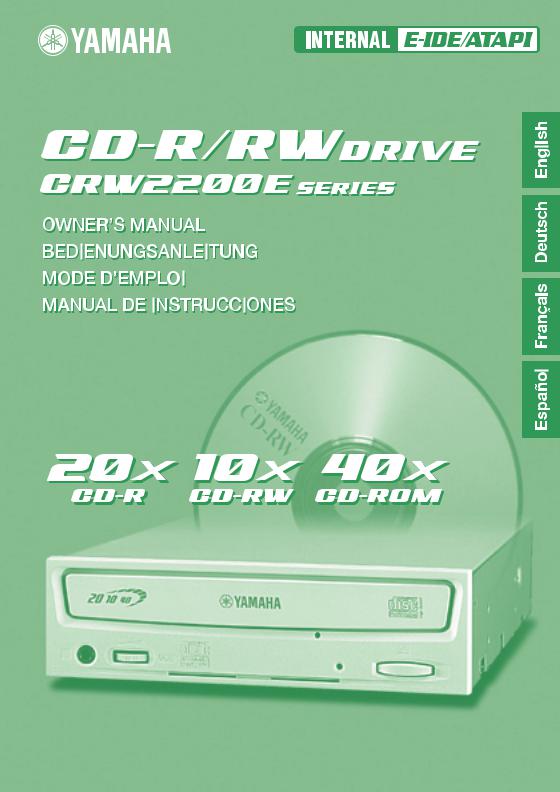

(DECLARATION OF CONFORMITY PROCEDURE)
Responsible Party: |
Yamaha Electronics Corporation, USA |
Address: |
6660 Orangethorpe Avenue |
|
Buena Park, CA 90620 |
Telephone: |
714-522-9105 |
Fax: |
714-670-0108 |
Type of Equipment: |
CD Recordable/Rewritable Drive |
Model Name: |
CRW2200 |
|
CRW2200NB |
This device complies with Part 15 of the FCC Rules.
Operation is subject to the following conditions:
1)this device may not cause harmful interference, and
2)this device must accept any interference received including interference that may cause undesired operation.
See user manual instructions if interference to radio reception is suspected.
FCC INFORMATION (U.S.A.)
1.IMPORTANT NOTICE: DO NOT MODIFY THIS UNIT!
This product, when installed as indicated in the instructions contained in this manual, meets FCC requirements. Modifications not expressly approved by Yamaha may void your authority, granted by the FCC, to use the product.
2.IMPORTANT: When connecting this product to accessories and/or another product use only high quality shielded cables. Cable/s supplied with this product MUST be used. Follow all installation instructions. Failure to follow instructions could void your FCC authorization to use this product in the USA.
3.NOTE: This product has been tested and found to comply with the requirements listed in FCC Regulations, Part 15 for Class “B” digital devices. Compliance with these requirements provides a reasonable level of assurance that your use of this product in a residential environment will not result in harmful interference with other electronic devices. This equipment generates/uses radio frequencies and, if not installed and used according to the instructions found in the users manual, may cause interference harmful to the operation of other electronic devices. Compliance with FCC regulations does not guarantee that interference will not occur in all installations. If this product is found to be the source of interference, which can be determined by turning the product “OFF” and “ON”, please try to eliminate the problem by using one of the following measures:
Relocate either this product or the device that is being affected by the interference.
Utilize power outlets that are on different branch (circuit breaker or fuse) circuits or install AC line filter/s.
In the case of radio or TV interference, relocate/reorient the antenna. If the antenna lead-in is 300 ohm ribbon lead, change the lead-in to coaxial type cable.
If these corrective measures do not produce satisfactory results, please contact the local retailer authorized to distribute this type of product. If you can not locate the appropriate retailer, please contact Yamaha Electronics Corporation, USA,
6660 Orangethorpe Avenue, Buena Park, CA 90620 U.S.A.
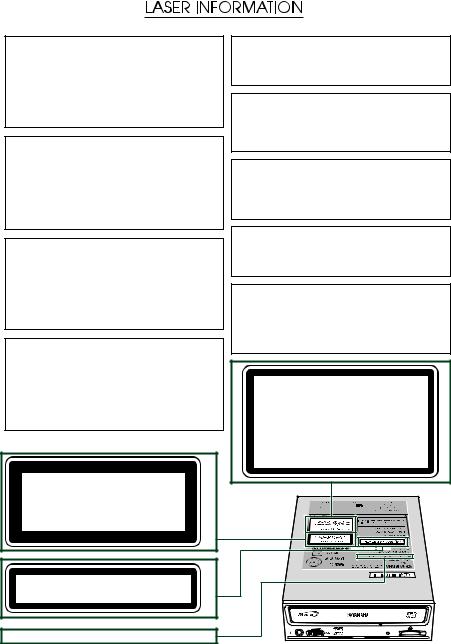
Laser Product Class: Class 1
Laser Diode Properties Wavelength: 780-787 nm
Pulse Durations and Max. Output at the lens of the Laser Pickup Unit
Read Mode: 0.7mW (Continuous)
Write Mode: Max. 38mW
(for 166ns, Min. Cycle 86.6ns)
Laserprodukt-Klasse: Klasse 1
Eigenschaften der Laserdiode Wellenlänge: 780-787 nm
Impulsdauer und max. Ausgang an der Linse der Laser-Abtasteinheit
Lesemodus: 0,7mW (kontinuierlich)
Schreibmodus: Max. 38mW
(für 166ns, Zyklusmin. 86,6ns)
Classe du produit laser: Classe 1
Caractéristiques de la diode laser Longueur d’onde: 780-787 nm
Durée des impulsions et sortie maximum depuis la lentille du bloc capteur optique
Mode de lecture: 0,7mW (continue)
Mode de gravure: max. 38mW
(pour 166ns, cycle min. 86,6ns)
Clase de producto láser:Clase 1
Propiedades del diodo láser Longitud de onda: 780-787 nm
Duración del pulso y potencia de salida máxima en el objetivo de la unidad captora láser
Modo de lectura: 0,7mW (continua)
Modo de escritura: máx. 38mW
(para 166ns, ciclo mínimo 86,6ns)
CLASS 1 LASER PRODUCT
LASER KLASSE 1 PRODUKT
LUOKAN 1 LASERLAITE
KLASS 1 LASER APPARAT
PRODUIT LASER DE CLASSE 1
DANGER - VISIBLE AND / OR INVISIBLE LASER RADIATION WHEN OPEN. AVOID DIRECT EXPOSURE TO BEAM.
COMPLIES WITH 21 CFR CHAPTER1, SUBCHAPTER J.
CAUTION
Use of controls or adjustments or performance of procedures other than those specified herein may result in hazardous radiation exposure.
ACHTUNG
Halten Sie sich beim Bedienen und Einstellen der Bedienungselemente sowie bei der Bedienungsabfolge an die Anleitung, da sonst gefährliche Strahlen austreten können.
ATTENTION
L’emploi de commandes, de réglages ou un choix de procédures différents des spécifications de cette brochure peut entraîner une exposition à d’éventuelles radiations pouvant être dangereuses.
PRECAUCION
El usar los controles o ajustar o realizar procedimientos diferentes a los especificados aquí resultará en peligrosas exposiciones a la radiación.
VARO! |
AVATTAESSA JA SUOJALUKITUS OHITETTAESSA |
|
OLET ALTTINA NÄKYMÄTTÖMÄLLE |
|
LASERSÄTEILYLLE. ÄLÄ KATSO SÄTEESEEN. |
VARNING! OSYNLIG LASERSTRÅLNING NÄR DENNA DEL ÄR ÖPPNAD OCH SPÄRREN ÄR URKOPPLAD. BETRAKTA EJ STRÅLEN. STRÅLEN ÄR FARLIG.
CAUTION |
- VISIBLE AND / OR INVISIBLE LASER RADIATION WHEN OPEN. |
|
AVOID EXPOSURE TO BEAM. |
VARNING |
- SYNLIG OCH / ELLER OSYNLIG LASERSTRÅLNING NÄR DENNA |
|
DEL ÄR ÖPPNAD. STRÅLEN ÄR FARLIG. |
VARO ! |
AVATTAESSA OLET ALTTIINA NÄKYVÄLLE JA / TAI |
|
NÄKYMÄTÖMÄLLE LASERSÄTEILYLLE. ÄLÄ KATSO SÄTEESEEN. |
VARNING |
- SYNLIG OCH / ELLER OSYNLIG LASERSTRÅLNING NÄR DENNA DEL |
|
ÄR ÖPPNAD. BETRAKTA EJ STRÅLEN. |
VORSICHT ! SICHTBARE UND / ODER UNSICHTBARE LASERSTRAHLUNG
WENN ABDECKUNG GEÖFFNET. NICHT DEM STRAHL AUSSETZEN.
ATTENTION - RADIATION VISIBLE ET / OU INVISIBLE LORSQUE L’APPAREIL
EST OUVERT. EVITEZ TOUTE EXPOSITION AU FAISCEAU.
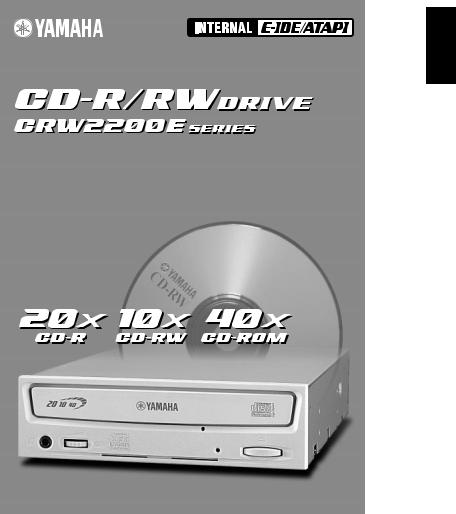
English
OWNER’S MANUAL
i

SAFETY PRECAUTIONS
PLEASE READ CAREFULLY BEFORE PROCEEDING
These precautions explain how to use the device correctly and safely, thereby preventing injury to yourself or to others. This section has been sub-divided into a WARNING section and a CAUTION section, according to the likelihood and nature of any potential injuries or damage inflicted. They relate to your personal safety, and also help you minimize the risk of damaging the device. Please read these sections carefully before proceeding.
 WARNING
WARNING
Always follow the basic precautions listed below to avoid the possibility of serious injury or even death from electrical shock, short-circuiting, damages, fire, or other hazards. These precautions include, but are not limited to, the following:
●Do not open the device or attempt to disassemble or modify it.
Otherwise, there is an increased risk of electrical shock or fire. The device contains no userserviceable parts. If it appears to be malfunctioning, have it inspected by qualified service personnel.
●Do not look inside the device.
If you expose your eyes to the laser inside the device, you risk damage to or loss of your vision.
●Do not insert fingers or foreign objects into the device.
Otherwise, there is an increased risk of personal injury, electrical shock, damage to the device, or fire. Please take particular care if small children are present.
●Do not expose the device to rain or use it near water or in damp or wet conditions. Do not place containers on it that contain liquids which might spill into any openings.
Otherwise, there is an increased risk of electrical shock, fire, or personal injury.
●Follow the Owner’s Manual carefully.
Otherwise, there is an increased risk of personal injury, electrical shock, fire, or damage to the unit. Follow the correct procedure when setting up the device.
●If unusual smells, sounds, or smoke emanate from the device, or if liquids enter the device, switch the computer off immediately and unplug it from the power outlet.
Otherwise, there is an increased risk of electrical shock, fire, or damage to the device. Return the device immediately to the store where it was purchased, or alternatively, to the nearest Yamaha dealer (listed at the back of this manual).
●Make sure the computer is electrically grounded. Otherwise, there is an increased risk of electrical shock.
●When opening up the computer, always unplug the computer from the electrical outlet. Do not touch the plug with wet hands.
Otherwise, there is an increased risk of electrical shock.
●When used in a fan-cooled system, the drive should not be exposed to temperatures outside the range 5 – 40°C (41 – 104°F).
ii

 CAUTION
CAUTION
Always follow the basic precautions listed below to avoid the possibility of physical injury to yourself or others, or damage to the instrument or other property. These precautions include, but are not limited to, the following:
●Always unplug the computer from the electrical outlet if it will not be used for a prolonged period of time, or if there is a risk of lightning.
Otherwise, there is an increased risk of electrical shock, short-circuiting, or fire.
●Do not expose the device to excessive heat or vibrations, such as in areas subject to direct sunlight or near a heater.
Also avoid placing it in extreme cold or in areas subject to excessive dust.
Otherwise, the front panel may become disfigured or the internal components may be damaged.
●Do not use the device near other electrical products such as televisions, radios, or speakers. Otherwise, this may cause interference which can affect the proper operation of those other products.
●Do not place the device in an unstable position.
Otherwise, it may accidentally fall down and be damaged or cause personal injury.
●Mount the device horizontally.
Otherwise, written data may be destroyed. Set the device up according to the instructions in the Owner’s Manual.
●Always remove the disc from the tray before transporting the device. Otherwise, written data may be destroyed.
●When cleaning the device, never use benzene, paint thinners, detergents, or chemically coated wiping cloths. Also, do not place vinyl, plastic, or rubber objects on the device.
Otherwise, the device may be damaged or its front panel may become discolored. Use a soft, dry cloth to wipe the device.
●Do not rest your weight on or place heavy objects on the device and do not use excessive force on the buttons, switches or connectors.
Otherwise, there is an increased risk of damage to the device or personal injury.
●Do not listen to audio with headphones at high volume or for prolonged periods of time. Otherwise, there is an increased risk of hearing loss.
●Before using the device, set the volume dial to its lowest setting. Otherwise, sudden bursts of sound can cause hearing loss.
●Do not place the device near sources of magnetic interference, such as computer displays. Magnetic interference can affect the operation and stability of the device.
●Have the device serviced regularly.
Otherwise, dust can build up inside the device, increasing the risk of fire or damage. For information about service charges, contact the store where the device was purchased, or alternatively, the nearest Yamaha dealer (listed at the back of this manual). The device should be serviced about once a year.
●This drive is for use only with movable equipment, weighing less than 18 kg.
iii

■ About CD-R/RW discs
Please read the following regarding the handling of CD-R/RW discs.
1.Do not expose discs to excessive heat, such as in areas subject to direct sunlight or near a heater.
Also, avoid keeping them in a humid place.
2.Do not touch the surface of a disc.
When handling a disc, hold it by its edges.
3.Remove dust and dirt from the surface of a disc.
Use air-based dust removers. The surface of a disc may be scratched if wiped with a dry cloth.
4.Do not stick labels on the surface of a disc.
5.Do not write on the surface of a disc except where indicated.
6.Do not clean discs with chemicals or detergents.
7.Do not bend or drop discs.
8.Do not use irregularly shaped discs, such as a star or a heart or a card shaped, etc. Such discs could damage your new CD-R/RW drive. (Use only circular discs.)
1.The information contained in this manual is subject to change without prior notice.
2.All trademarks contained in this manual belong to their respective owners.
3.Yamaha does not bear any responsibility for any outcome as a result of using this device.
4.Reproduction of this manual, either in part or in full, is expressly forbidden.
■ Precautions for Transportation
Before transporting the device, always put it in its original box. If the device is transported without adequate packing, the internal components may be damaged and cause the device to malfunction.
■ Copyrights
When writing to CD-R/RW, make sure that you are not infringing any copyrights. It is illegal to copy audio CDs for non-personal use. When backing up software, please make sure that you are not infringing any software copyrights for that product.
■ WARRANTY
YAMAHA AND SUPPLIERS ACCEPT NO LIABILITY FOR THE LOSS OF ANY DATA OR ANY PROBLEMS CAUSED AS A RESULT. AS A PRECAUTION, IT IS RECOMMENDED THAT THE DISCS BE TESTED AFTER THEY HAVE BEEN WRITTEN TO.
FURTHERMORE, UNDER NO CIRCUMSTANCES DOES YAMAHA AND SUPPLIERS GUARANTEE THE RELIABILITY OF THE DISCS.
The CRW2200E conforms to the power-saving mode of a computer to reduce power consumption. (→P. 39)
iv

Table of Contents |
|
Introduction........................................................................ |
1 |
Features of the CRW2200E Drive ...................................................... |
1 |
Before Use ......................................................................... |
3 |
System Requirements .......................................................................... |
3 |
Supported Discs................................................................................... |
4 |
Serial Number ..................................................................................... |
6 |
Front and Rear of Unit............................................................ |
7 |
Front Panel .......................................................................................... |
7 |
Rear Panel ........................................................................................... |
8 |
Setup Procedures ................................................................. |
9 |
Tools.................................................................................................... |
9 |
Setup Flowchart................................................................................. |
10 |
Connecting the CRW2200E Drive .................................................... |
11 |
Operation .......................................................................... |
28 |
Loading a Disc .................................................................................. |
28 |
Ejecting a Disc .................................................................................. |
28 |
Ejecting a Disc in an Emergency ...................................................... |
29 |
Troubleshooting .................................................................. |
30 |
Appendix........................................................................... |
34 |
Writing Modes................................................................................... |
34 |
About the firmware ........................................................................... |
36 |
LED Indicator Messages ................................................................... |
37 |
CRW2200E Specifications................................................................ |
37 |
Index.................................................................................................. |
40 |
©2001 YAMAHA CORPORATION. All Rights Reserved.
This document may not, in whole or in part, be copied, photocopied, reproduced, translated, transmitted, or reduced to any electronic medium of machine readable form without prior consent in writing from Yamaha.
Windows is a registered trademark of Microsoft Corporation. SafeBurn™ is a trademark of Yamaha Corporation.
All other trademarks are the property of their respective companies.
v

 Introduction
Introduction
Features of the CRW2200E Drive
High speed writing/reading
The CRW2200E drive supports up to 20X-speed writing of CD-R discs,*1 and up to 10X-speed writing/rewriting of CD-RW discs.*2 Furthermore, the drive supports data reading and digital audio data extraction at up to 40X speed.
SafeBurn™ (Enhanced write stability technology)
●Generous 8MB of buffer memory
Because of the large data storage area, stable disc writing is possible even at fast speeds.
●Buffer Underrun Protection
When data transfer from the host PC is interrupted, Buffer Underrun Protection is activated to keep precious CD-R discs from going to waste. (→P. 2)
●Optimum Write Speed Control
Before writing to CD-R, the CRW2200E drive checks the disc’s capability and automatically selects the optimum writing speed for greater reliability.
Reliable writing
●Yamaha’s proprietary Pure-Phase Laser System (patent applied for)
This technology reduces phase interference of the laser beam, so that it projects accurately onto the disc. Jitter value an important measure of recording quality, has been improved 25% compared with Yamaha models not using this technology.
●Running OPC (Optimum Power Control)
Running OPC automatically adjusts the output of the laser according to the characteristics of the disc being used. Running OPC provides greatly enhanced recording reliability for various manufacturer’s discs.
High-fidelity digital audio
The CRW2200E drive supports extraction of digital audio data at up to 40X speed, as well as the recording of digital sound with complete fidelity even when writing at 20X speed. Also, the built-in digital audio output is ideal for the pure transmission of an audio signal when connected to the SPDIF (digital audio) input of the computer's sound card.
CD TEXT support
Information such as the song name or artist name can be recorded on Audio CDs using CD creation software. The text data on the created disc can be displayed on a CD player that is compatible with the CD TEXT format.
1
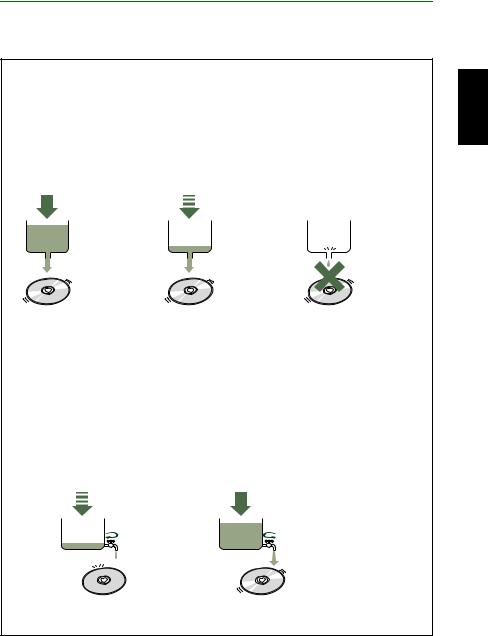
Introduction
*1 16Xor 20X-speed writing is enabled with the Partial CAV method. (→P. 5)
*2 10X-speed writing/rewriting is enabled with the CLV method, and the 4X-10X Full CAV method. (→P. 6)
Buffer Underrun Defined
CD-R/RW drives are equipped with buffer memory. This memory temporarily stores data while a disc is being recorded. When buffer memory becomes empty (due to unexpected interruptions or the system’s inability to keep up with the writing process), a write error occurs. This error is known as a “buffer underrun error.”
Data |
|
|
|
Data is stored in |
If data transfer is |
|
buffer memory... |
interrupted... |
|
and then written |
then buffer memory |
|
begins to empty |
|
|
to disc |
|
|
|
When no data is left in buffer memory...
(Buffer Underrun)
writing fails (Buffer Underrun Error)
A Buffer Underrun Error will permanently ruin the disc.
Yamaha Buffer Underrun Protection
Buffer Underrun Protection is featured in Yamaha’s CRW2200 series CD-R/ RW drives. When a buffer underrun is about to occur, a buffer underrun error is prevented by temporarily suspending the writing process. Writing resumes when enough data has accumulated again in buffer memory. Buffer Underrun Protection on the CRW2200 series is extremely accurate, resulting in seamless recording between stop and continuation points.
|
|
If data transfer is |
Once data transfer |
interrupted... |
resumes normally... |
and buffer memory is |
about to empty... |
writing is suspended
enough data has accumulated in
buffer memory...
writing continues
Yamaha Buffer Underrun Protection ensures error-free results.
2

 Before Use
Before Use
System Requirements
In order to use the CRW2200E drive, your computer system will need to meet the following requirements.
Note
The CRW2200E drive may not write at the maximum speed depending on your computer’s system configuration.
PC/AT-Compatible Computer
CPU: Pentium II-class or higher, 300MHz or faster.
RAM: 32MB memory (64MB or more recommended).
Note
If you are using Windows 2000 Professional operating system, you need 64MB memory or more.
A vacant 5.25-inch drive bay slot (For supplemental drive).
Operating System (OS)
Windows 95 (OSR2 or later), Windows 98, Windows 98 Second Edition, Windows Me, Windows NT4.0 with Service Pack 3 or later, Windows 2000 Professional.
CD Writing Software
The CRW2200E drive requires CD writing software to write onto a CD-R/RW disc. When you use the CD writing software, make sure that it supports the CRW2200E drive.
Note
For details about how to install and use the software, refer to the documentation that came with it.
Hard Drive Space
When writing to a CD-R/RW disc, you will need a working area (50 to 100MB free space) on the hard drive. When creating an image file for all data to write to a CD-R/ RW disc, in addition to the working area, you will need as much hard drive space as that data (up to 900MB in total). However, such hard drive space for the image file is not needed when you are directly writing from a hard drive or CD-ROM drive, etc. (on-the-fly writing).
About a disk image file
You can collect data files into a single disk image file for a CD-R/RW disc. Also, note that an image file is useful when writing multiple discs with the same content. For further details, refer to the documentation that came with your writing software.
3
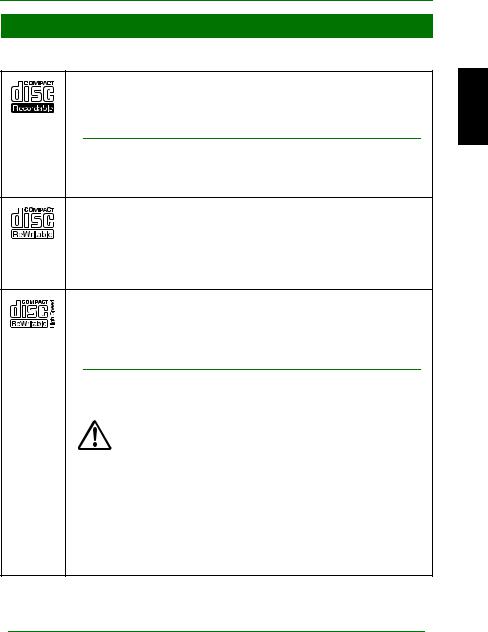
Before Use
Supported Discs
The CRW2200E drive can write to discs that carry the following logos:
CD-R discs*1
The CRW2200E drive can write to these discs at 1X, 2X, 4X, 8X, 12X, 16X, or 20X speed. These discs can be played back in a CD-ROM drive or a CD player.
Notes
•16Xor 20X-speed writing is enabled with Partial CAV method. ( →P. 5)
•For 8X or faster writing, use CD-R discs that match their respective writing speeds.
CD-RW discs*2
There are two types of CD-RW discs: those that support write/rewrite speeds of 1X, 2X, and 4X, and those that support only 2X. The CRW2200E drive can write/rewrite at 2X or 4X speed on the first type of disc, and at 2X on the second type of disc. These discs can be read/played on a device (e.g., CDROM drive) that supports “CD-RW.”
High Speed CD-RW discs*3
These discs allow writing/rewriting at 4X to 10X speeds. The CRW2200E drive can write/rewrite these discs at 4X, 8X, or 10X speed. These discs can be read/played by a CD-RW drive that bears the High Speed CD-RW logo, or by a device (e.g., CD-ROM drive) that supports “CD-RW.”
Note
10X-speed writing/rewriting is enabled with the CLV method, and the 4X-10X Full CAV method. (→P. 6)
• In order to write, erase, or read these discs using a CD-R/RW drive, a drive bearing the High Speed CD-RW logo must be used. When using a CD-ROM drive to read these discs, the drive must be capable of reading CD-RW discs.
•If these discs are used in a CD-R/RW drive not bearing the High Speed CD-RW logo, the discs may not be recognized, resulting in the computer not operating correctly or other malfunctions occurring.
•Refer to the page at the URL below before attempting to read these discs on a Yamaha CD-R/RW drive not bearing the High Speed CD-RW logo.
URL: http://www.yamaha.co.jp/english/product/computer/
*1 Compatible with Orange Book Part 2.
*2 Compatible with Orange Book Part 3 Vol. 1.
*3 Compatible with Orange Book Part 3 Vol. 2.
About the Orange Book
The Orange Book standard defines how all recordable discs (including CD-R and CD-RW) are written. Part 2 of the Orange Book standard relates to CD-R discs, and Part 3 to CD-RW discs. The standard was named after the color of the book’s pages.
4

Before Use
About CD-ROMs
A CD-ROM disc is a compact disc containing high-density read-only data. It has many applications, including the playback of music and video, the archiving of data, as well as on-line documentation. The following are descriptions of each CD-ROM format:
CD-DA: Up to 79 minutes of stereo audio is written in 16-bit resolution at a sampling rate of 44.1kHz for a 79 minute disc.
Data CD: Up to 700 megabytes of computer data is stored in standard ISO9660 format for a 700MB disc.
Video CD: These hold movies in which the video and audio data has been compressed using MPEG-1 technology.
About Partial CAV (Constant Angular Velocity)
Writing to a CD-R disc is normally done using the CLV (Constant Linear Velocity) method. In this method, the disc rotation speed will be so adjusted as to keep a constant data transfer rate at any portion of the disc. In other words, the disc rotation speed will vary in CLV writing.
In contrast, the CAV (Constant Angular Velocity) method uses a constant disc rotation speed for all portions of the disc so that the data transfer rate will vary. Because the CAV method has the advantage of largely increasing the data transfer rate with a minimum load to the drive’s mechanism (compared to CLV’s rotation speed adjustment), many current CD-ROM drives use the CAV method. CD formats define the constant linear density of written data (data should be written onto the disc track in the constant pitch) so that the amount of recorded data per disc rotation will increase as the writing point moves from the inner to the outer. In other words, in CAV writing the outer portion has an increased data transfer rate.
The CRW2200E drive uses the CAV method in the inner portions as well as the CLV method in the outer portions (Partial CAV) in order to enable up to 20Xspeed writing. The drive will control the disc rotation speed to start writing at 12X speed in the inner portions, gradually accelerating up to 20X speed and maintaining 20X speed in the outer portions.
5
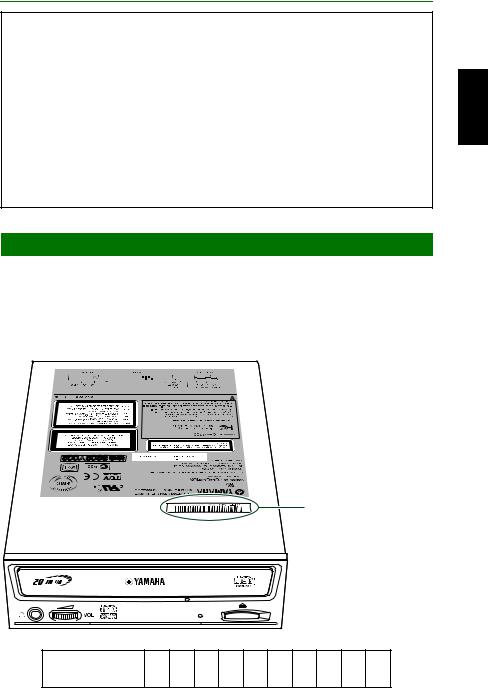
Before Use
About 10X-speed writing/rewriting of a High Speed CD-RW disc
10X-speed writing/rewriting of a High Speed CD-RW disc is enabled with the CLV method, and the 4X-10X Full CAV method.
Commonly, writing/rewriting is enabled with the CLV method.
When writing/rewriting with packet writing, you can also select the Full CAV method.
For more details, refer to the documentation that came with your writing software. (Make sure that your writing software supports the Full CAV method. The supplied writing software is supported.)
When you try to open and compile directly your file of the CD-RW disc with an application, Yamaha recommends you using the Full CAV method.
Serial Number
Once you have taken the CRW2200E drive out of its packaging, you should immediately note down the serial number found at the top of the drive with the bar code. You may need to refer to this number when requesting Customer Support services. In the box below the following diagram, write down the 10-character serial number (consisting of 3 letters followed by 7 digits).
Serial number
(3 letters and 7 digits)
Serial No.
6

 Front and Rear of Unit
Front and Rear of Unit
Front Panel
The CRW2200E drive’s front panel features the following:
|
|
|
|
|
|
Disc tray
The tray is used to hold the disc. It slides out from the drive unit when a disc needs to be loaded or unloaded. (→P. 28)
Manual Eject hole
Only use this if no other method is available for unloading a disc. (→P. 29)
Eject button
Press this button when you need to open or close the tray. Remove the disc after the tray has opened. (→P. 28)
Headphone jack
You can connect stereo headphones to this stereo mini jack and listen to an audio CD loaded in the drive.
Headphone volume control
Adjust this control to set a suitable volume level when listening to an audio CD using the headphone jack. Slide the knob to the left to decrease the volume and to the right to increase it.
LED
Indicates the operation status of the CRW2200E drive. (→P. 37)
7
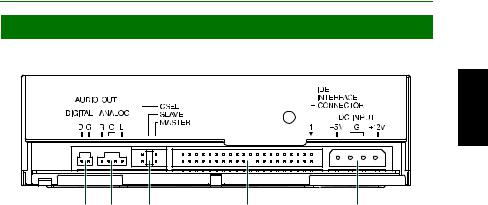
Front and Rear of Unit
Rear Panel
The CRW2200E drive’s rear panel features the following:
|
|
|
|
DIGITAL AUDIO OUT connector
If your sound card has a SPDIF (digital audio) input connector, you can connect the DIGITAL AUDIO OUT connector of the unit to the SPDIF connector using a digital audio cable (sold separately).(→P. 22)
ANALOG AUDIO OUT connector
Connect one end of the 4-pin audio cable to this and the other end to your computer’s sound card or built-in audio. (→P. 21)
Jumper switch
Plug a plastic shunt into this jumper switch to select the connection, either IDE master or slave. The CRW2200E drive’s factory setting is SLAVE. ( →P. 17)
IDE INTERFACE CONNECTOR
Insert the connector of the IDE cable here. Make sure you align the red line of the ribbon cable with pin 1 of the drive’s connector, marked “IDE INTERFACE CONNECTOR 1.” ( →P. 20)
DC INPUT connector
Insert the power connector from your computer’s power supply in this socket to feed power to the drive. (→P. 23)
8
